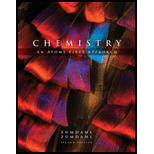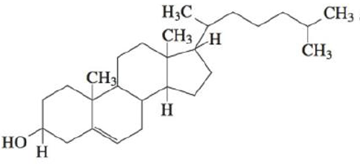
Chemistry: An Atoms First Approach
2nd Edition
ISBN: 9781305079243
Author: Steven S. Zumdahl, Susan A. Zumdahl
Publisher: Cengage Learning
expand_more
expand_more
format_list_bulleted
Concept explainers
Textbook Question
Chapter 3, Problem 156CP
Cholesterol (C27H46O) has the following structure:

In such shorthand structures, each point where lines meet represents a carbon atom, and most H atoms are not shown. Draw the complete structure showing all carbon and hydrogen atoms. (There will be four bonds to each carbon atom.)
Expert Solution & Answer
Trending nowThis is a popular solution!

Students have asked these similar questions
Apply the NANSTE law to the MnO4- + 8H+ + 5e- ⇄ Mn2+ + 4H2O
In the Nernst Law, how much is RT / F?
Hi can you please help me solve these problems? thank you
Chapter 3 Solutions
Chemistry: An Atoms First Approach
Ch. 3 - Distinguish between the terms electronegativity...Ch. 3 - Prob. 2RQCh. 3 - When an element forms an anion, what happens to...Ch. 3 - Define the term lattice energy. Why,...Ch. 3 - Explain how bond energies can be used to estimate...Ch. 3 - Prob. 6RQCh. 3 - Prob. 7RQCh. 3 - Explain the terms resonance and delocalized...Ch. 3 - Define formal charge and explain how to calculate...Ch. 3 - The compounds AlCl3, CrCl3, and ICl3 have similar...
Ch. 3 - How would you name HBrO4, KIO3, NaBrO2, and HIO?...Ch. 3 - Explain the electronegativity trends across a row...Ch. 3 - The ionic compound AB is formed. The charges on...Ch. 3 - Prob. 3ALQCh. 3 - The bond energy for a CH bond is about 413 kJ/mol...Ch. 3 - Prob. 5ALQCh. 3 - Which has the greater bond lengths: NO2 or NO3?...Ch. 3 - Prob. 7ALQCh. 3 - The second electron affinity values for both...Ch. 3 - What is meant by a chemical bond? Why do atoms...Ch. 3 - Why are some bonds ionic and some covalent?Ch. 3 - Prob. 11ALQCh. 3 - Prob. 12ALQCh. 3 - Prob. 13ALQCh. 3 - Why do we call Ba(NO3)2 barium nitrate, but we...Ch. 3 - Prob. 15ALQCh. 3 - Prob. 16ALQCh. 3 - Compare and contrast the bonding found in the...Ch. 3 - Describe the type of bonding that exists in the...Ch. 3 - Some of the important properties of ionic...Ch. 3 - Prob. 21QCh. 3 - Distinguish between the following terms. a....Ch. 3 - What is the electronegativity trend? Where does...Ch. 3 - Prob. 24QCh. 3 - In general the higher the charge on the ions in an...Ch. 3 - Combustion reactions of fossil fuels provide most...Ch. 3 - Which of the following statements is/are true?...Ch. 3 - Three resonance structures can be drawn for CO2...Ch. 3 - Prob. 29QCh. 3 - Prob. 30QCh. 3 - Without using Fig. 3-4, predict the order of...Ch. 3 - Without using Fig. 3-4, predict the order of...Ch. 3 - Without using Fig. 3-4, predict which bond in each...Ch. 3 - Without using Fig. 3-4, predict which bond in each...Ch. 3 - Prob. 35ECh. 3 - Prob. 36ECh. 3 - Which of the following incorrectly shows the bond...Ch. 3 - Indicate the bond polarity (show the partial...Ch. 3 - Predict the type of bond (ionic, covalent, or...Ch. 3 - List all the possible bonds that can occur between...Ch. 3 - Hydrogen has an electronegativity value between...Ch. 3 - Rank the following bonds in order of increasing...Ch. 3 - Would you expect each of the following atoms to...Ch. 3 - Prob. 44ECh. 3 - Prob. 45ECh. 3 - Prob. 46ECh. 3 - Predict the empirical formulas of the ionic...Ch. 3 - Prob. 48ECh. 3 - Write electron configurations for a. the cations...Ch. 3 - Write electron configurations for a. the cations...Ch. 3 - Which of the following ions have noble gas...Ch. 3 - What noble gas has the same electron configuration...Ch. 3 - Give the formula of a negative ion that would have...Ch. 3 - Prob. 54ECh. 3 - Give three ions that are isoelectronic with neon....Ch. 3 - Consider the ions Sc3+, Cl, K+, Ca2+, and S2....Ch. 3 - Prob. 57ECh. 3 - Prob. 58ECh. 3 - Which compound in each of the following pairs of...Ch. 3 - Which compound in each of the following pairs of...Ch. 3 - Use the following data for potassium chloride to...Ch. 3 - Prob. 62ECh. 3 - Consider the following energy changes: E(kJ/mol)...Ch. 3 - Prob. 64ECh. 3 - Consider the following:...Ch. 3 - Prob. 66ECh. 3 - Rationalize the following lattice energy values:...Ch. 3 - The lattice energies of FeCl3, FeCl2, and Fe2O3...Ch. 3 - Prob. 69ECh. 3 - Prob. 70ECh. 3 - Prob. 71ECh. 3 - Acetic acid is responsible for the sour taste of...Ch. 3 - Prob. 73ECh. 3 - The major industrial source of hydrogen gas is by...Ch. 3 - Prob. 75ECh. 3 - Prob. 76ECh. 3 - Prob. 77ECh. 3 - Prob. 78ECh. 3 - Write Lewis structures that obey the octet rule...Ch. 3 - Write Lewis structures that obey the octet rule...Ch. 3 - Write Lewis structures that obey the octet rule...Ch. 3 - Write Lewis structures that obey the octet rule...Ch. 3 - Prob. 83ECh. 3 - Lewis structures can be used to understand why...Ch. 3 - The most common exceptions to the octet rule are...Ch. 3 - Prob. 86ECh. 3 - Write Lewis structures for the following. Show all...Ch. 3 - Prob. 88ECh. 3 - Benzene (C6H6) consists of a six-membered ring of...Ch. 3 - Borazine (B3N3H6) has often been called inorganic...Ch. 3 - An important observation supporting the concept of...Ch. 3 - Consider the following bond lengths: CO143pmC9O123...Ch. 3 - A toxic cloud covered Bhopal, India, in December...Ch. 3 - Peroxyacetyl nitrate, or PAN, is present in...Ch. 3 - Order the following species with respect to...Ch. 3 - Place the species below in order of the shortest...Ch. 3 - Prob. 97ECh. 3 - Prob. 98ECh. 3 - Write Lewis structures that obey the octet rule...Ch. 3 - Write Lewis structures for the species in Exercise...Ch. 3 - A common trait of simple organic compounds is to...Ch. 3 - Prob. 102ECh. 3 - Oxidation of the cyanide ion produces the stable...Ch. 3 - Prob. 104ECh. 3 - Name the compounds in parts ad and write the...Ch. 3 - Prob. 106ECh. 3 - Prob. 107ECh. 3 - Prob. 108ECh. 3 - Prob. 109ECh. 3 - Prob. 110ECh. 3 - Prob. 111ECh. 3 - Prob. 112ECh. 3 - Prob. 113ECh. 3 - Prob. 114ECh. 3 - Prob. 115ECh. 3 - Prob. 116ECh. 3 - Prob. 117ECh. 3 - Write the formula for each of the following...Ch. 3 - Prob. 119ECh. 3 - Write the formula for each of the following...Ch. 3 - Prob. 121ECh. 3 - Prob. 122ECh. 3 - Arrange the following in order of increasing...Ch. 3 - For each of the following, write an equation that...Ch. 3 - Prob. 125AECh. 3 - Write Lewis structures for CO32, HCO3, and H2CO3....Ch. 3 - Which member of the following pairs would you...Ch. 3 - What do each of the following sets of...Ch. 3 - Although both Br3 and I3 ions are known, the F3...Ch. 3 - Prob. 130AECh. 3 - Prob. 131AECh. 3 - Identify each of the following elements: a. a...Ch. 3 - Prob. 133AECh. 3 - Prob. 134AECh. 3 - When molten sulfur reacts with chlorine gas, a...Ch. 3 - The study of carbon-containing compounds and their...Ch. 3 - Prob. 137CWPCh. 3 - Prob. 138CWPCh. 3 - Complete the following table to predict whether...Ch. 3 - Prob. 140CWPCh. 3 - Prob. 141CWPCh. 3 - List the bonds PCl, PF, OF, and SiF from least...Ch. 3 - Arrange the atoms and/or ions in the following...Ch. 3 - Prob. 144CWPCh. 3 - Prob. 145CWPCh. 3 - Which of the following compounds or ions exhibit...Ch. 3 - Prob. 147CPCh. 3 - Prob. 148CPCh. 3 - Given the following information: Energy of...Ch. 3 - Think of forming an ionic compound as three steps...Ch. 3 - Use data in this chapter (and Chapter 2) to...Ch. 3 - Three processes that have been used for the...Ch. 3 - Prob. 153CPCh. 3 - Prob. 154CPCh. 3 - Draw a Lewis structure for the N,...Ch. 3 - Cholesterol (C27H46O) has the following structure:...Ch. 3 - Consider the following computer-generated model of...Ch. 3 - For each of the following ions, indicate the total...Ch. 3 - Prob. 159IPCh. 3 - A polyatomic ion is composed of C, N, and an...
Knowledge Booster
Learn more about
Need a deep-dive on the concept behind this application? Look no further. Learn more about this topic, chemistry and related others by exploring similar questions and additional content below.Similar questions
- Hi can you please help me solve this problem? thank youarrow_forwardAn electrode process takes place at a metal-solution interface. Indicate the current condition that must be met for Faradaic rectification to occur.arrow_forwardAt a metal-solution interface, an electron is exchanged, and the symmetry factor beta < 0.5 is found in the Butler-Volmer equation. What does this indicate?arrow_forward
- Please do these questions within the SCH4U course please with full steps since I am still unsure how to format my answers! Thank you so much.arrow_forwardWhen two solutions, one of 0.1 M KCl (I) and the other of 0.1 M MCl (II), are brought into contact by a membrane. The cation M cannot cross the membrane. At equilibrium, x moles of K+ will have passed from solution (I) to (II). To maintain the neutrality of the two solutions, x moles of Cl- will also have to pass from I to II. Explain this equality: (0.1 - x)/x = (0.1 + x)/(0.1 - x)arrow_forwardCalculate the variation in the potential of the Pt/MnO4-, Mn2+ pair with pH, indicating the value of the standard potential. Data: E0 = 1.12.arrow_forward
arrow_back_ios
SEE MORE QUESTIONS
arrow_forward_ios
Recommended textbooks for you
 Chemistry: The Molecular ScienceChemistryISBN:9781285199047Author:John W. Moore, Conrad L. StanitskiPublisher:Cengage Learning
Chemistry: The Molecular ScienceChemistryISBN:9781285199047Author:John W. Moore, Conrad L. StanitskiPublisher:Cengage Learning Chemistry: Principles and ReactionsChemistryISBN:9781305079373Author:William L. Masterton, Cecile N. HurleyPublisher:Cengage Learning
Chemistry: Principles and ReactionsChemistryISBN:9781305079373Author:William L. Masterton, Cecile N. HurleyPublisher:Cengage Learning Chemistry: Principles and PracticeChemistryISBN:9780534420123Author:Daniel L. Reger, Scott R. Goode, David W. Ball, Edward MercerPublisher:Cengage Learning
Chemistry: Principles and PracticeChemistryISBN:9780534420123Author:Daniel L. Reger, Scott R. Goode, David W. Ball, Edward MercerPublisher:Cengage Learning World of Chemistry, 3rd editionChemistryISBN:9781133109655Author:Steven S. Zumdahl, Susan L. Zumdahl, Donald J. DeCostePublisher:Brooks / Cole / Cengage Learning
World of Chemistry, 3rd editionChemistryISBN:9781133109655Author:Steven S. Zumdahl, Susan L. Zumdahl, Donald J. DeCostePublisher:Brooks / Cole / Cengage Learning General, Organic, and Biological ChemistryChemistryISBN:9781285853918Author:H. Stephen StokerPublisher:Cengage Learning
General, Organic, and Biological ChemistryChemistryISBN:9781285853918Author:H. Stephen StokerPublisher:Cengage Learning General Chemistry - Standalone book (MindTap Cour...ChemistryISBN:9781305580343Author:Steven D. Gammon, Ebbing, Darrell Ebbing, Steven D., Darrell; Gammon, Darrell Ebbing; Steven D. Gammon, Darrell D.; Gammon, Ebbing; Steven D. Gammon; DarrellPublisher:Cengage Learning
General Chemistry - Standalone book (MindTap Cour...ChemistryISBN:9781305580343Author:Steven D. Gammon, Ebbing, Darrell Ebbing, Steven D., Darrell; Gammon, Darrell Ebbing; Steven D. Gammon, Darrell D.; Gammon, Ebbing; Steven D. Gammon; DarrellPublisher:Cengage Learning

Chemistry: The Molecular Science
Chemistry
ISBN:9781285199047
Author:John W. Moore, Conrad L. Stanitski
Publisher:Cengage Learning

Chemistry: Principles and Reactions
Chemistry
ISBN:9781305079373
Author:William L. Masterton, Cecile N. Hurley
Publisher:Cengage Learning

Chemistry: Principles and Practice
Chemistry
ISBN:9780534420123
Author:Daniel L. Reger, Scott R. Goode, David W. Ball, Edward Mercer
Publisher:Cengage Learning

World of Chemistry, 3rd edition
Chemistry
ISBN:9781133109655
Author:Steven S. Zumdahl, Susan L. Zumdahl, Donald J. DeCoste
Publisher:Brooks / Cole / Cengage Learning

General, Organic, and Biological Chemistry
Chemistry
ISBN:9781285853918
Author:H. Stephen Stoker
Publisher:Cengage Learning

General Chemistry - Standalone book (MindTap Cour...
Chemistry
ISBN:9781305580343
Author:Steven D. Gammon, Ebbing, Darrell Ebbing, Steven D., Darrell; Gammon, Darrell Ebbing; Steven D. Gammon, Darrell D.; Gammon, Ebbing; Steven D. Gammon; Darrell
Publisher:Cengage Learning
Stoichiometry - Chemistry for Massive Creatures: Crash Course Chemistry #6; Author: Crash Course;https://www.youtube.com/watch?v=UL1jmJaUkaQ;License: Standard YouTube License, CC-BY
Bonding (Ionic, Covalent & Metallic) - GCSE Chemistry; Author: Science Shorts;https://www.youtube.com/watch?v=p9MA6Od-zBA;License: Standard YouTube License, CC-BY
General Chemistry 1A. Lecture 12. Two Theories of Bonding.; Author: UCI Open;https://www.youtube.com/watch?v=dLTlL9Z1bh0;License: CC-BY